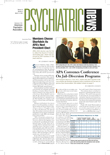From a common-sense perspective, one would expect psychosis to wreck havoc with a person’s efforts to learn, remember, react, and otherwise use his or her brain. One might also expect that putting off treatment for psychosis would have a baleful effect on neurocognition as well.
Intuition, however, may not always be right, a new study reported in the March American Journal of Psychiatry suggests. It has found no adverse neurocognitive effects either from psychosis or from delaying treatment for it.
The study was conducted by Björn Rund, Ph.D., a psychologist at the University of Oslo in Norway, other Norwegian investigators, and Thomas McGlashan, M.D., a professor of psychiatry at Yale University.
The investigation included 207 Norwegian subjects who were diagnosed for the first time with schizophrenia, schizophreniform disorder, schizoaffective disorder, brief psychotic episode, delusional disorder, affective psychosis with mood incongruent delusions, or psychotic disorder not otherwise specified.
The subjects were assessed for symptoms three months after starting treatment. The subjects were also given neuropsychological tests after they were stabilized or experienced symptom remission, which was, on average, about three months after starting treatment. The neuropsychological tests evaluated verbal learning, working memory, motor speed, and executive function. They included, for example, the California Verbal Learning Test, the Finger-Tapping Test, and the Wisconsin Card-Sorting Test.
The researchers then attempted to see whether there were significant links between the subjects’ psychotic symptoms at three months after starting treatment and their neuropsychological test results at stabilization or remission, which was, on average, also three months after starting treatment.
They found neither, suggesting that psychosis had little impact on neurocognition. And even when the investigators looked only at subjects who were not experiencing remission from their psychotic symptoms at the time of neuropsychological testing, which was 43 percent of subjects, they still could find no strong connections between psychosis and neurocognition.
Thus psychosis appears to have minimal impact on neurocognition, they concluded.
The investigators then looked for a significant link between duration of untreated psychosis in the subjects—that is, the time from onset of psychotic symptoms to the start of adequate treatment for psychosis—and the subjects’ neuropsychological test scores at the time of stabilization or remission. They again failed to find a link, implying that putting off treatment for psychosis does not damage neurocognition.
A similar result has been obtained by other researchers—for instance, Beng-Choon Ho, M.D., clinical director of the University of Iowa Schizophrenia Research Center, and coworkers (
Psychiatric News, January 7, 2003). Some other scientists, however, have found the opposite—for example, Delbert Robinson, M.D., a research psychiatrist with Zucker Hillside Hospital in Glen Oaks, N.Y., and colleagues (see
page 64).
So why have some researchers found that delaying treatment for psychosis does not hurt neurocognition, whereas others have found the opposite? One possibility, Robinson told Psychiatric News, is that the biological underpinnings of persons with first-episode schizophrenia or schizoaffective disorder differ from the biological underpinnings of persons with other types of first-episode psychosis. As a result, delaying psychosis treatment might impair neurocognition in the former group, but not in the latter.
The study was funded by the Norwegian Research Council, the National Council for Mental Health/Health and Rehabilitation, the National Institute of Mental Health, the Norwegian Health Ministry, and the Theodore and Vada Stanley Foundation.
Am J Psychiatry 2004 161 466
